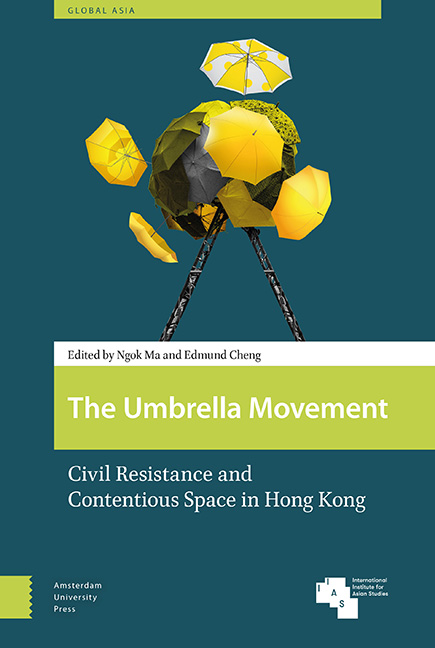Book contents
- Frontmatter
- Contents
- Acknowledgements
- Introduction: Civil Resistance and Contentious Space in Hong Kong
- Part A Trajectory and Contingency
- Part B Repertories and Strategies
- Part C Regime and Public Responses
- Part D Comparative Perspectives
- Appendix: The Umbrella Movement—Chronology of Major Events
- Index
- Publications/Global Asia
2 - Spontaneity and Civil Resistance: A Counter Frame of the Umbrella Movement
Published online by Cambridge University Press: 21 November 2020
- Frontmatter
- Contents
- Acknowledgements
- Introduction: Civil Resistance and Contentious Space in Hong Kong
- Part A Trajectory and Contingency
- Part B Repertories and Strategies
- Part C Regime and Public Responses
- Part D Comparative Perspectives
- Appendix: The Umbrella Movement—Chronology of Major Events
- Index
- Publications/Global Asia
Summary
Abstract
This chapter examines the contingent and endogenous causes that sparked the Umbrella Movement in Hong Kong. Spurred by two contingent events generating pre-emptive and massive mobilization, the movement was a spontaneous transformation of the long-planned Occupy Central campaign. Networked efficiently through social media, autonomous individuals from diverse backgrounds rallied in various physical spaces, resulting in a self-mobilized and decentralized protest structure. These dynamics and ecology facilitated participatory practices and sustained a resilient occupation. Using an on-site survey, in-depth interviews, and participant observation, this chapter constructs a counter-frame conceptualizing the Umbrella Movement as a popular civil resistance, thereby contesting the official and media framings that regard the occupation as an illegal assembly, separatist movement, or social justice movement.
Keywords: framing, occupation, social media, public space, Hong Kong, Umbrella Movement
Introduction
This chapter examines how and why spontaneous events vividly transformed Occupy Central with Love and Peace (OCLP), a planned, elitist civil disobedience campaign, into the spontaneous and popular Umbrella Movement. Mainstream literature regards spontaneity as either only important in the early stage of social movements, or impromptu, emotional, unplanned, and hence difficult to conceptualize. However, as Snow and Moss stipulate, spontaneity is “events, happenings, and lines of action, both verbal and nonverbal, which were not planned, intended, prearranged, or organized in advance of their occurrence” that routinely shape the occurrence, course, and character of protest events (2014: 1223). Flesher Fominaya (2015) also debunks this understanding of spontaneity by referring to how the evolution and maintenance of collective actions are path-dependent and conditioned by contingent events as much as by antecedent framing.
This chapter brings the idea of spontaneity to an examination of the dynamics of an occupation that is unparalleled both locally and globally. According to Snow and Moss (2014: 1122), the triggers of spontaneity involve: (1) an ambiguous moment; (2) emotional priming, (3) non-hierarchical organization; and (4) a specific ecological context—all intertwined in a movement. Unplanned and unintended contingent events are not an antithesis of rationality and organization. Instead, the Umbrella Movement shows that human beings can and do make conscious, on-the-spot decisions in the face of emotion and uncertainty. Spontaneity is thus pervasive and consequential in collective actions, and should be treated as a process rather than as a stage (Cheng and Chan, 2017).
- Type
- Chapter
- Information
- Umbrella MovementCivil Resistance and Contentious Space in Hong Kong, pp. 51 - 76Publisher: Amsterdam University PressPrint publication year: 2019



